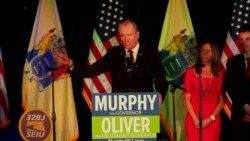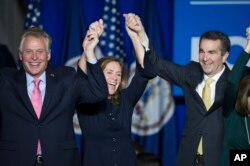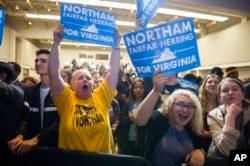President Donald Trump suffered a political setback Tuesday when Democrats won easy victories in governor's races in Virginia and New Jersey. In addition, Democrats cheered a turnout that could have major implications for next year's congressional midterm elections, when all 435 House seats and one-third of the Senate will be on the ballot.
Democrats are pointing to exit polls in both Virginia and New Jersey that showed that anger at Trump was a major factor in stimulating Democrats to get to the polls. They also note Democratic gains in the battle for state delegate seats in Virginia, another sign of grass-roots enthusiasm that could help Democrats in races for lower-level offices across the country.
Sending a message
In New Jersey, Governor-elect Phil Murphy, a Democrat, saw his election as a direct rebuke of the Republican president.
"New Jersey sent an unmistakable message to the entire nation. We are better than this!" Murphy told cheering supporters at his victory rally.
In Virginia, Democrat Ralph Northam defeated Republican Ed Gillespie in a campaign that focused, in part, on Trump and his policies, especially on immigration. At a news conference Wednesday, Northam said his victory showed that Virginians had a message for the country and the world.
"The divisiveness, the hatred, the bigotry, the politics that is tearing this country apart, that is not the United States of America that people love and it certainly not the Commonwealth of Virginia that they love," he said.
Political analysts said Democratic enthusiasm and a focus on Trump were clearly on display in both states.
"We have heard for months and months about all this energy on the left. It had not materialized until tonight," said Steve Peoples of the Associated Press. "A big night for Democrats and, really, it was a repudiation of sorts of the Trump nationalist message."
Even some Republicans saw the results as a rejection of the Trump political brand. Representative Scott Taylor of Virginia told the New York Times that he believes the president's "divisive rhetoric" helped the Democrats on Tuesday.
"I do believe this is a referendum on this administration," Taylor said.
Embracing the president
During his trip to Asia, Trump tweeted that Gillespie lost in Virginia because he didn't "embrace me or what I stand for." Divining why Gillespie lost is likely to spark a resurgence of the Republican debate as to how closely members of Congress should back the president as they look toward next year's elections.
If Democrats continue to use Trump as a motivator to boost turnout, it could spark trouble for Republicans in next year's midterms.
"I think the danger signs are that it looks like Democratic voters are energized and it is easy to mobilize them and turnout, particularly in swing states, is going to favor Democrats," said Rutgers University political scientist Richard Harris via Skype.
Harris also noted that both Murphy in New Jersey and Northam in Virginia emphasized the importance of governance in their campaigns, which he believes shows Democrats are willing to go beyond simply positioning themselves as anti-Trump.
Alternative agenda
Democrats must be prepared to offer real alternatives to Trump and Republican policies, argues Jim Kessler with Third Way, a center-left public policy advocacy group.
"If voters believe the Democrats are focused on jobs and the economy, even if they don't know the details, then that will give them more wind at their back in the 2018 elections, so I think they are inching in the right direction," Kessler said.
In the short term, the Democratic wins in Virginia and New Jersey are likely to put greater pressure on congressional Republicans to pass tax reform reasonably soon so that they have something to show voters next year.
"The pressure on them was probably about a 9.5 on a 10-point scale, and now it is probably 9.9, so it was high already and it is just going to get more intense," said Richard Harris.
The election results dominated the one-year anniversary of Trump's election, and Tuesday's Democratic victories could signal a shift in the political fortunes of a president whose public approval rating has remained near or below 40 percent for much of his presidency, a historic low for a new president.








